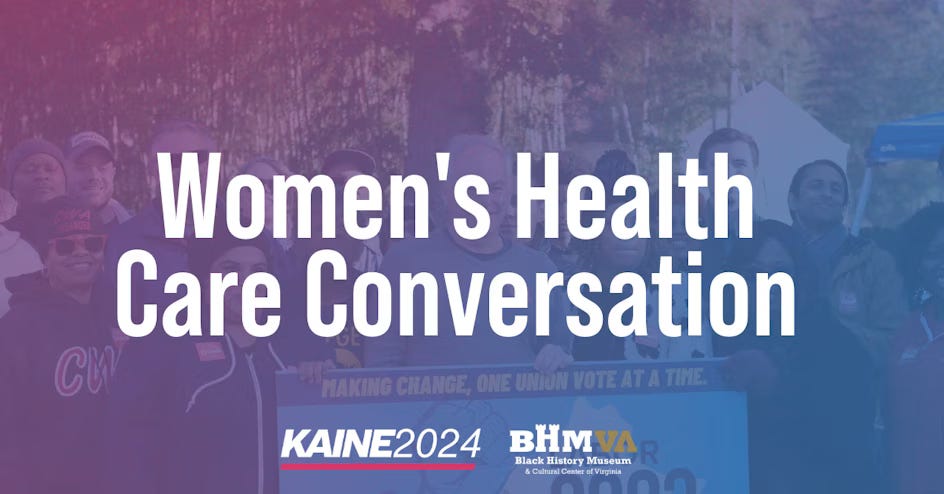Lucas-Torian: Money Chiefs to Tour Virginia; Women's Health Event; Obamacare List of 14 Facts; Rouse Health Event
🚩 There are 86 days until the U.S. House and U.S. Senate primaries on June 18, 2024. Early voting begins in 40 days on May 3rd.
🚩 There are 226 days until Election Day November 5, 2024.
☺️ Thank you to all of our subscribers and readers!
Virginia’s Money Committees Chiefs to Lead “Virginia Families First Tour”
Senate Finance and Appropriations Chair, L. Louise Lucas and House Appropriations Chair, Luke Torian, will travel from Portsmouth to Manassas and all the way to Pennington Gap to speak with Virginians. Saying that “amidst misinformation, this tour is a direct line to Virginians,” they’ve announced that they will speak on bread and butter issues they’re focused on in the Virginia General Assembly.

Release from Virginia Families First: Senate and House Democrats are thrilled to announce the "Virginia Families First Tour," a state-wide initiative showcasing the impactful budget designed with Virginia's families in mind led by Senate Finance and Appropriations Chair, L. Louise Lucas (D-Portsmouth) and House Appropriations Chair, Luke Torian (D-Prince William). Amidst misinformation, this tour is a direct line to Virginians, highlighting investments in education, healthcare, and infrastructure that prioritize the well-being and prosperity of every family across the commonwealth. Ready to engage and listen, we're bringing the conversation about our future directly to you, from every corner of Virginia. The tour kicks off Monday, March 25 in Hampton Roads. House and Senate Democratic released the following statement:
"As we embark on the Virginia Families First Tour, we are not merely discussing the progress we have made; we are presenting tangible evidence of our commitment to every family in Virginia. This tour is a demonstration to our citizens that our families' first slogan is not just empty words, but a genuine promise. We are thrilled to visit various communities across our beautiful Commonwealth, to share our accomplishments, and to reaffirm our devotion to creating a prosperous Virginia for all."
🚩 Address any additional questions to JoNathan Collins at jonathan@vasenatedems.com
March 25: Hampton Roads
Mustard Seed – 11 AM - 340 High Street, Portsmouth, Va 23704
March 26: Central and Northern Virginia
Virginia State Capitol - 9:00 AM - In front of the steps of the capitol building
Edward L. Kelly Leadership Center (Prince William County) – 12:30 PM
14715 Bristow Rd, Manassas, VA 20112
March 27: Southwest Virginia
Johnston Memorial Hospital (Abingdon/Bristol) 1:00 PM- 127 Healthcare Drive, Pennington Gap, VA 24277
TODAY in Richmond: Health Care Convo with Kaine, McClellan
TODAY: Sunday, March 24 / 2–4pm EDT / Location: 122 W Leigh St, Richmond, VA 23220
Join Senator Tim Kaine to participate in an important discussion about women's reproductive health, maternal health and mental health. The Senator will be joined by Congress Woman Jennifer McClellan along with a group of women panelist to offer their expertise, insights, and experiences for the Senator to implement as he's talking to voters on the campaign trail and standing up for Virginian's in Washington.
Obamacare: 14 Facts
From the advocacy group Protect Our Care: 14 things to know about the Affordable Care Act. The 14th anniversary of the #AffordableCareAct was March 23rd.
1. More Americans than ever have signed up for coverage through the Marketplaces. In 2024, a record-breaking 21.3 million people signed up for health coverage through the ACA Marketplace. This is the highest number of Americans to ever enroll in an Open Enrollment Period. Families are now saving an average of $2,400 a year on their health insurance premiums.
2. Not a single Republican voted to pass the Affordable Care Act. 14 years ago, not a single Republican voted for the ACA and since then, they have continuously called for repeal. The repeal attempts started in 2016, when Republicans passed the Restoring Americans' Healthcare Freedom Reconciliation Act of 2015, only to be vetoed by President Obama. 2017 brought numerous attemptsat repeal all of which failed to pass and become law.
3. Millions of Americans with pre-existing conditions are protected. Due to the ACA, insurers in the individual market can no longer drop or deny coverage, or charge more due to a pre-existing condition. An estimated 129 million Americans have a pre-existing health condition.
4. The ACA requires free preventive care. Thanks to the ACA, health plans must cover preventive services — like flu shots, cancer screenings, contraception, and mammograms – at no cost to consumers. This includes the 179 million Americans with employer coverage. Importantly, the ACA requires plans to cover all vaccinations recommended by the CDC’s Advisory Committee on Immunization Practices (ACIP), including vaccines for COVID-19.
5. Prescription drugs are considered essential. Thanks to the ACA, insurers have to cover what are known as “essential health benefits,” and that includes prescription drugs. This required all health insurance plans to cover at least one drug in every category and class of approved medicines. The ACA has also increased access to affordable drugs. The ACA’s Biologics Price Competition and Innovation Act paved the way for the Food and Drug Administration (FDA) to approve biosimilars, cheaper alternatives to expensive biologics. This provision is projected to save $54 billion between 2017 and 2026.
6. Women no longer can be charged more than men for the same coverage. Due to the ACA, insurers can no longer charge women more than men for the same coverage, and insurers are now required to cover important health benefits like maternity care. Before the ACA, only 12 percent of individual market plans offered maternity care. The ACA established maternity coverage as one of the ten essential health benefits required on all new individual and small group policies. The American Rescue Plan created a pathway to coverage for pregnant Americans, allowing states to extend postpartum coverage under Medicaid from 60 days to 12 months following pregnancy.
7. More than 60 million gained access to birth control with no out-of-pocket costs. The ACA guarantees that private health plans cover 18 methods of contraception and make them available to 58 million patients with no out-of-pocket costs. More than 99 percent of sexually active women have used contraceptives at some point in their lifetimes, and approximately 60 percent of women of reproductive age currently use at least one birth control method. This ACA provision has saved money for women and their families: women saved $1.4 billion on birth control pills alone in 2013.
8. The ACA ended annual and lifetime limits, including for people with employer-based coverage. Insurers can no longer put annual or lifetime limits on the care you receive. At the time the ACA was passed, 91 million Americans had health care through their employers that imposed lifetime limits. Many such plans capped benefits at $1 million, functionally locking people with complex medical needs out of coverage. 179 million Americans with employer coverage are protected from lifetime limits, in addition to the millions with ACA Marketplace coverage.
9. Forty states plus the District of Columbia have expanded Medicaid coverage. Due to the ACA, states can expand Medicaid to millions of adults who previously did not qualify for affordable health care. Nearly 25 million Americans were enrolled in Medicaid thanks to Medicaid expansion. Between 2013 and 2020, states that expanded their programs saw a 33.9 percent increase in Medicaid enrollment.
10. Medicaid expansion has improved health outcomes and saved lives. A study published in the Journal of Health Economics found that Medicaid expansion reduced all-cause mortality in people aged 20 to 64 by 3.6 percent. According to the Center on Budget and Policy Priorities, Medicaid expansion saved the lives of 19,200 older adults aged 55 to 64 between 2014 and 2017. At the same time, 15,600 older adults died prematurely as a result of their state’s decision not to expand the program.
11. Rural hospitals benefit from Medicaid expansion and lower premiums. Through lower premiums and expanded Medicaid, the ACA has profoundly reduced uncompensated care costs, which are often the direct result of individuals who are uninsured or underinsured. In 2019, uncompensated care costs in expansion states were less than half of those in non-expansion states. Compared to 2013, hospitals’ uncompensated care costs decreased by more than $14 billion in 2017, or 26 percent.
12. Medicaid expansion leads to a decrease in income inequality. A January 2021 study found the ACA helped reduce income inequality across the board, but far more dramatically in Medicaid expansion states. The bottom 10th percentile of earners In Medicaid expansion states saw a 22.4 percent boost in their income, compared to 11.4 percent in non-expansion states. A 2019 study found that Medicaid Expansion also caused a “significant” reduction in poverty.
13. Medicaid expansion leads to more access to preventive care services. Medicaid expansion has helped patients access preventive care, including colon cancer screenings and access to kidney transplants, and has made diabetes medication more affordable for low-income patients. Access to preventive care through Medicaid expansion reduced racial disparities in cancer care and resulted in earlier diagnosis and treatment for Black patients. According to the Center for American Progress, Black women were more likely to receive care thanks to the ACA.
14. Medicaid expansion and coverage through ACA marketplaces have improved infant and maternal health. Health coverage improves infant and maternal mortality outcomes. One study found that reductions in maternal mortality in expansion states were concentrated among Black mothers, “suggesting that expansion could be contributing to decreasing racial disparities in maternal mortality.” Expansion has also been tied to improving health outcomes for Black babies, significantly reducing racial disparities in low birth weight and premature birth.
The Sorensen Institute is currently seeking civic-minded VA high school students to apply to the 2024 High School Leaders Program (HSLP). Applications for the 2024 HSLP are due on Monday, March 25th 2024. However, we have flexibility to extend the deadline for students who need extra time.
Listen to the latest episode of Pod Virginia with Lauren Burke and Michael Pope:
➡️ SUBSCRIBE TO BLACK VIRGINIA NEWS. “One had better die fighting against injustice than die like a dog or a rat in a trap.” —Ida Wells. 👨🏽💻 Send your press releases, submissions, tips, pitches, comments and corrections to BlackVirginiaNews@gmail.com.
















